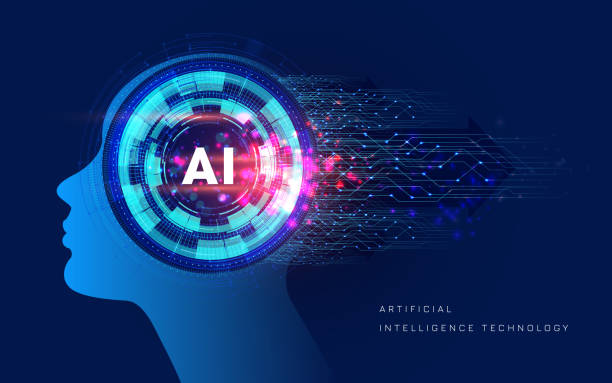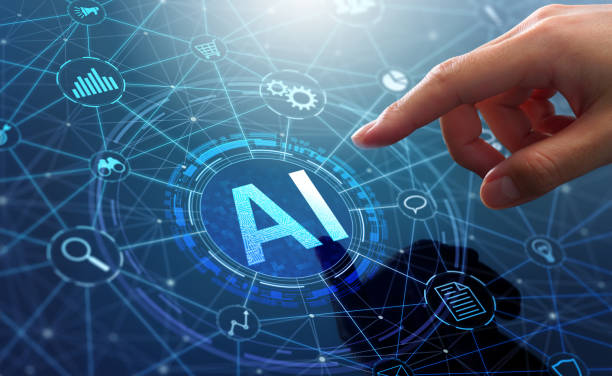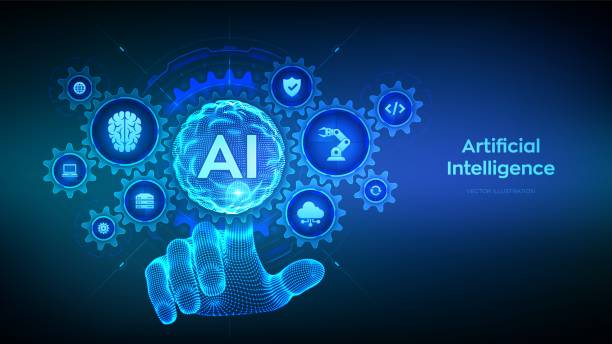What is Artificial Intelligence and how does it work?

What is Artificial Intelligence and how does it work?
#Artificial_Intelligence (AI) is a branch of computer science that aims to develop systems that can perform tasks that typically require human intelligence.
These tasks include learning, problem-solving, pattern recognition, reasoning, and natural language understanding.
In other words, artificial intelligence strives to enable machines to think, learn, and act.
Artificial intelligence works in various ways, but most AI systems are based on Machine Learning algorithms.
These algorithms allow machines to learn from data without being explicitly programmed.
For example, a machine learning algorithm can learn to recognize cats by analyzing a large volume of images.
Deep Learning is a subset of machine learning that uses artificial neural networks with multiple layers to analyze data.
This method is very effective in complex tasks such as facial recognition and language translation.
To better understand the functioning of artificial intelligence, it can be divided into three main categories: Narrow AI, General AI, and Super AI.
Narrow AI is designed to perform specific tasks, such as virtual assistants (like Siri and Alexa) or recommendation systems (like Netflix).
General AI is capable of independently performing any task that a human can do.
Super AI surpasses human intelligence and can solve more complex problems.
From the perspective of Wikipedia, artificial intelligence is a vast and complex field that is rapidly advancing and has a profound impact on our lives.
Does your company’s website perform as befits your brand? In today’s competitive world, your website is your most important online tool. Rasaweb, a specialist in designing professional corporate websites, helps you to:
✅ Attract customer credibility and trust
✅ Turn website visitors into customers
⚡ Get a free consultation!
Types of artificial intelligence: Approaches and applications

Types of artificial intelligence: Approaches and applications
Artificial intelligence can be categorized based on capabilities and different approaches.
Based on capabilities, artificial intelligence is divided into three main categories: Narrow or Weak AI, General AI, and Super AI.
Narrow AI, which is currently the most common type of artificial intelligence, is designed to perform specific tasks.
This type of artificial intelligence is used in applications such as facial recognition, language translation, and recommendation systems.
General AI, which is still in the development stages, will be able to perform any task that a human can do independently.
Super AI, which is a theoretical concept, surpasses human intelligence and can solve more complex problems.
Based on approaches, artificial intelligence can be divided into several categories, including Machine Learning, Deep Learning, Natural Language Processing (NLP), Computer Vision, and Robotics.
Machine learning is an approach that allows machines to learn from data without being explicitly programmed.
Deep learning is a subset of machine learning that uses artificial neural networks with multiple layers to analyze data.
Natural Language Processing allows machines to understand and generate human language.
Computer Vision allows machines to understand and analyze images.
Robotics deals with the design and construction of robots that can perform physical tasks.
The applications of artificial intelligence are very broad and diverse.
In the field of healthcare, artificial intelligence can be used to diagnose diseases, develop drugs, and provide personalized care.
In the financial industry, artificial intelligence can be used to detect fraud, manage risk, and provide personalized financial services.
In transportation, artificial intelligence can be used to develop self-driving cars, manage traffic, and improve safety.
In education, artificial intelligence can be used to provide personalized training, assess student performance, and develop educational content.
These are just a few examples of the many applications of artificial intelligence.
Machine Learning: The beating heart of artificial intelligence

Machine Learning: The beating heart of artificial intelligence
Machine Learning is one of the most important branches of artificial intelligence, which allows machines to learn from data without being explicitly programmed.
In fact, instead of giving machines precise instructions to perform a task, machine learning algorithms identify patterns and relationships in the data by analyzing it, and use these patterns to make predictions or decisions.
Machine learning is divided into three main categories: Supervised Learning, Unsupervised Learning, and Reinforcement Learning.
In supervised learning, the algorithm is trained using labeled data, meaning that each input data has a corresponding label or output.
The goal of the algorithm is to learn a function that can map inputs to correct outputs.
In unsupervised learning, the algorithm is trained using unlabeled data.
The goal of the algorithm is to find hidden patterns and structures in the data.
In reinforcement learning, the algorithm learns how to behave by taking actions in an environment and receiving rewards or penalties, in order to maximize its reward.
Machine learning algorithms are used in a wide range of applications.
For example, in the field of image recognition, machine learning algorithms can be used to recognize faces, objects, and scenes in images.
In the field of natural language processing, machine learning algorithms can be used to translate languages, detect emotions, and summarize texts.
In the financial field, machine learning algorithms can be used to detect fraud, predict the market, and manage risk.
Artificial intelligence has developed dramatically in recent years with the advancement of machine learning algorithms.
| Learning Type | Description | Applications |
|---|---|---|
| Supervised Learning | Training with labeled data | Image recognition, price prediction |
| Unsupervised Learning | Training with unlabeled data | Clustering, dimensionality reduction |
| Reinforcement Learning | Learning through reward and punishment | Games, robotics |
Natural Language Processing (NLP): Understanding and producing human language

Natural Language Processing (NLP): Understanding and producing human language
Natural Language Processing (NLP) is a branch of artificial intelligence that enables machines to understand and generate human language.
The goal of NLP is to develop algorithms and models that can analyze human text and speech, extract its meaning, and answer questions, generate new texts, and interact with humans in natural language.
NLP uses various techniques, including Syntax Analysis, Semantic Analysis, and Discourse Analysis.
Syntax analysis examines the grammatical structure of sentences.
Semantic analysis examines the meaning of words and phrases in a sentence.
Discourse analysis examines the relationship between sentences in a text.
The applications of NLP are very broad and diverse.
For example, in the field of machine translation, NLP can be used to translate texts from one language to another.
In the field of sentiment analysis, NLP can be used to detect the emotions present in a text or speech.
In the field of chatbots, NLP can be used to build robots that can interact with humans in natural language.
In the field of information retrieval, NLP can be used to improve the accuracy and speed of search.
Voice assistants such as Siri and Alexa use NLP to understand voice commands and answer questions.
Recent advances in deep learning have led to significant improvements in NLP performance.
Large language models such as GPT-3 and BERT are able to generate very realistic texts and perform complex NLP tasks with high accuracy.
These advances have led to NLP being more widely used in many industries and fields.
Are you tired of your online store website not being able to generate as much revenue as it could? Rasaweb, a specialist in designing professional online store websites, solves this problem forever!
✅ Increase sales rate and revenue
✅ High loading speed and excellent user experience
⚡ Get a free online store website design consultation
Computer Vision: The eyes of artificial intelligence

Computer Vision: The eyes of artificial intelligence
Computer Vision is a branch of artificial intelligence that enables machines to understand and interpret images and videos.
The goal of computer vision is to develop algorithms and models that can recognize objects, people, scenes, and events in images and videos, understand the relationships between them, and extract useful information from them.
In simpler terms, computer vision allows computers to “see.”
Computer vision uses various techniques, including Edge Detection, Feature Detection, Image Classification, and Object Detection.
Edge detection identifies the boundaries between objects in an image.
Feature detection identifies important features in an image.
Image classification assigns a label to an image based on its content.
Object detection identifies and locates specific objects in an image.
The applications of computer vision are very broad and diverse.
For example, in the field of self-driving cars, computer vision is used to recognize traffic signs, pedestrians, and other vehicles.
In the field of medicine, computer vision is used to diagnose diseases from medical images.
In the field of security, computer vision is used to recognize faces and identify people.
In the field of retail, computer vision is used to track inventory and analyze customer behavior.
Recent advances in deep learning have led to significant improvements in the performance of computer vision.
Convolutional Neural Networks (CNNs) are specifically designed for processing images and have achieved very good results in many computer vision tasks.
These advances have led to computer vision being more widely used in many industries and fields.
The Future of Artificial Intelligence: Opportunities and Challenges

The Future of Artificial Intelligence: Opportunities and Challenges
Artificial intelligence is rapidly advancing and is expected to have a profound impact on our lives in the near future.
There are many opportunities to use artificial intelligence in various fields, but there are also challenges that need to be addressed.
One of the biggest opportunities for artificial intelligence is increasing productivity and efficiency.
Artificial intelligence can automate repetitive and tedious tasks and allow humans to focus on more creative and strategic tasks.
Artificial intelligence can also help improve decision-making by analyzing large volumes of data and providing accurate insights.
Artificial intelligence can revolutionize various fields such as healthcare, education, transportation, and manufacturing.
For example, artificial intelligence can be used to diagnose diseases, provide personalized training, develop self-driving cars, and optimize production processes.
However, there are also challenges that need to be addressed.
One of the biggest challenges is the issue of artificial intelligence ethics.
It must be ensured that artificial intelligence is used fairly and without discrimination, and that the rights and privacy of individuals are protected.
Another challenge is the issue of artificial intelligence security.
Artificial intelligence systems must be protected against cyber attacks and abuse.
Artificial intelligence has become an integral part of our lives.
Practical applications of artificial intelligence in everyday life

Practical applications of artificial intelligence in everyday life
Artificial intelligence is no longer an abstract concept, but is increasingly present in our everyday lives.
From virtual assistants in smartphones to recommendation systems on movie streaming platforms, artificial intelligence is subtly shaping our experiences.
One of the most common applications of artificial intelligence in everyday life is virtual assistants such as Siri, Alexa, and Google Assistant.
These assistants can answer our questions, set reminders, play music, and control smart home devices.
They use natural language processing to understand our voice commands and provide appropriate responses.
Recommendation systems are another common application of artificial intelligence.
By analyzing our purchase history, viewing history, and other data, these systems provide us with suggestions for purchasing goods, watching movies and series, and listening to music.
Movie streaming platforms such as Netflix and online shopping platforms such as Amazon use recommendation systems to improve user experience and increase sales.
Artificial intelligence is also used in security systems, cars, home appliances, and many other devices.
For example, facial recognition systems in smartphones and security cameras use artificial intelligence to identify people.
Modern cars use artificial intelligence to help drivers park, maintain a safe distance, and prevent accidents.
Smart home appliances use artificial intelligence to optimize energy consumption and provide personalized services.
| Application | Description |
|---|---|
| Virtual assistants | Answering questions, setting reminders, controlling devices |
| Recommendation systems | Suggesting goods, movies, and music |
| Security systems | Facial recognition, identifying people |
| Modern cars | Assisting with driving, preventing accidents |
How is Artificial Intelligence transforming businesses?

How is Artificial Intelligence transforming businesses?
Artificial intelligence (AI) is no longer an emerging technology, but has become an essential tool for businesses of all sizes.
From automating repetitive processes to providing valuable insights from data, artificial intelligence enables businesses to become more efficient, innovative, and customer-centric.
This means that artificial intelligence can increase the productivity of businesses.
One of the biggest benefits of artificial intelligence for businesses is the automation of processes.
Artificial intelligence can automate repetitive and time-consuming tasks such as data entry, answering frequently asked questions from customers, and processing orders.
This allows employees to focus on more strategic and creative tasks that create more value for the business.
Artificial intelligence can also help businesses gain valuable insights from their data.
By analyzing large volumes of data, artificial intelligence can identify patterns, trends, and relationships that are difficult for humans.
These insights can help businesses make better decisions about marketing, sales, product development, and other areas.
Artificial intelligence can also help businesses improve the customer experience.
AI-powered chatbots can answer customer questions and resolve their issues around the clock.
AI-powered recommendation systems can suggest products and services to customers that they are likely to be interested in.
Artificial intelligence helps businesses provide personalized and high-quality services to customers.
Did you know that your company’s website is the first point of contact for 75% of potential customers?
Your website is the face of your brand. With Rasaweb’s corporate website design services, create an online presence that builds customer trust.
✅ Creating a professional and lasting image of your brand
✅ Attracting target customers and increasing online credibility
⚡ Get a free consultation from Rasaweb experts!
Ethical and Social Issues of Artificial Intelligence

Ethical and Social Issues of Artificial Intelligence
Artificial intelligence (AI), despite its many advantages, also brings with it important ethical and social issues that need to be addressed.
With the increasing use of artificial intelligence in various fields, concerns have been raised about its impact on employment, privacy, discrimination, and human autonomy.
One of the biggest concerns is the impact of artificial intelligence on employment.
With many tasks being automated by artificial intelligence, there is concern that many jobs will be lost and unemployment rates will increase.
To address this challenge, attention should be paid to training and retraining employees for new jobs that are created by artificial intelligence.
Privacy is another important ethical issue related to artificial intelligence.
Artificial intelligence systems are often used to collect and analyze large volumes of personal data.
It must be ensured that this data is stored securely and is not used for unauthorized purposes.
Individuals should also be given more control over their personal data.
Discrimination is another serious concern related to artificial intelligence.
Artificial intelligence algorithms can unintentionally be discriminatory if they are trained with discriminatory data.
This can lead to unfair decision-making in areas such as hiring, lending, and the judicial system.
To prevent discrimination, it must be ensured that artificial intelligence algorithms are trained with diverse and non-discriminatory data.
Human autonomy is another issue that needs to be addressed in relation to artificial intelligence.
With increasing reliance on artificial intelligence systems, there is concern that humans will lose their decision-making power and become completely dependent on machines.
It must be ensured that humans remain in control of important decisions and that artificial intelligence systems only act as a tool to assist them.
How can we have a peaceful coexistence with artificial intelligence?

How can we have a peaceful coexistence with artificial intelligence?
A peaceful coexistence with artificial intelligence (AI) requires a proactive and informed approach that maximizes the benefits of this technology while minimizing its potential risks.
This requires cooperation between governments, businesses, researchers, and individuals in society.
One of the most important steps for a peaceful coexistence with artificial intelligence is to develop legal and ethical frameworks that regulate the use of this technology.
These frameworks should address issues such as privacy, discrimination, accountability, and transparency.
There should also be mechanisms to monitor the implementation of these frameworks.
Education and awareness also play an important role in a peaceful coexistence with artificial intelligence.
Individuals in society should be educated about artificial intelligence, its benefits and risks, and how to interact with artificial intelligence systems.
This will help them make more informed decisions about the use of this technology and defend their rights.
Cooperation between humans and machines is also a key factor in a peaceful coexistence with artificial intelligence.
Instead of considering artificial intelligence as a replacement for humans, we should see it as a tool to help humans perform their tasks.
This requires designing artificial intelligence systems that effectively cooperate with humans and use the strengths of both parties.
Finally, we must keep in mind that artificial intelligence is an evolving technology and a peaceful coexistence with it requires continuous learning and adaptation.
We must continuously assess the impacts of artificial intelligence on society and update our legal and ethical frameworks accordingly.
Frequently Asked Questions
| Question | Answer |
|---|---|
| What is Artificial Intelligence? | It is the simulation of human intelligence in machines programmed to think like humans and mimic their actions. |
| What are the main branches of Artificial Intelligence? | These include machine learning, deep learning, natural language processing, computer vision, and robotics. |
| What is Machine Learning? | It is a branch of artificial intelligence that focuses on enabling systems to learn from data and identify patterns without explicit programming. |
| Give examples of AI applications in our daily life. | Voice assistants (such as Siri and Alexa), recommendation systems in Netflix and Amazon, self-driving cars, and facial recognition software. |
| What is Deep Learning? | It is a subset of machine learning that uses multi-layered (deep) artificial neural networks to process large amounts of data. |
| What is Natural Language Processing (NLP)? | It is a branch of artificial intelligence that focuses on enabling computers to understand, interpret, and generate human language. |
| What are some of the ethical concerns related to AI? | These include bias in data, privacy, job loss, and responsibility in case of errors. |
| What are the main benefits of AI? | Increased efficiency, improved decision-making, automation of repetitive tasks, and discovery of complex patterns in data. |
| How is AI used in the field of healthcare? | In diagnosing diseases, discovering drugs, analyzing medical images, and providing personalized care to patients. |
| How do you see the future of AI? | It is expected to continue to evolve at a rapid pace, affecting all aspects of human life, from industry to education and entertainment. |
And other advertising services of Rasa Web Advertising Agency
Smart SEO: Transform your click-through rate with the help of attractive UI design.
Smart Reporting: A novel service to increase website visits through key page optimization.
Smart Advertising Campaign: A fast and efficient solution for analyzing customer behavior with a focus on smart data analysis.
Smart Brand Identity: A novel service to increase campaign management through user experience customization.
Smart SEO: A combination of creativity and technology to increase sales through user experience customization.
And over a hundred other services in the field of internet advertising, advertising consulting, and organizational solutions
Internet Advertising | Advertising Strategy | Advertorial
Resources
What is Artificial Intelligence and how does it work?
,What is Artificial Intelligence?
,What is Artificial Intelligence? Everything about Artificial Intelligence
,What is Artificial Intelligence and what are its applications?
? Achieve your business goals exactly with Rasaweb Afrin, a specialist in secure website design and modern digital marketing strategies.
📍 Tehran, Mirdamad Street, next to the Central Bank, South Kazerun Alley, Ramin Alley No. 6




